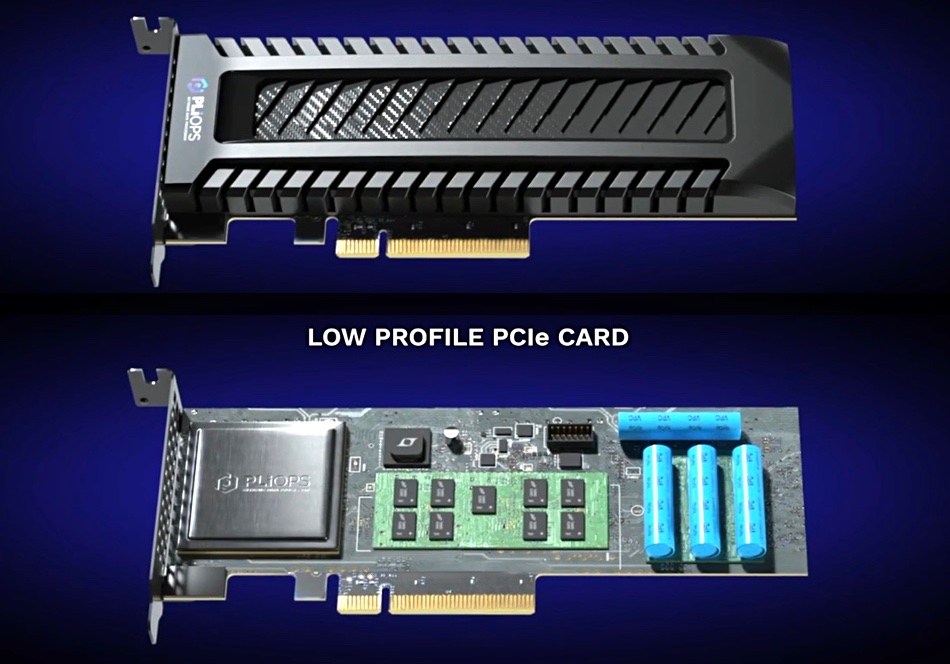Pliops has added three data services to its XDP x86 CPU offload card to give applications more NVMe SSD performance, endurance and better, faster drive failure protection.
The XDP is a low-profile PCIe-connected card with its own processor, the eXtreme Data Processor, which manages a group of NVMe SSDs. It is a key-value-based (KV) controller with built-in hardware engines for compression, encryption, RAID and other low-level storage functions. These functions are typically carried by system software, which Pliops refers to collectively as a storage engine.
Pliops has now announced the XDP-RAIDplus, XDP-AccelDB and the XDP-AccelKV data services versions of the XDP.

Uri Beitler, Pliops founder and CEO, zoomed in on the SSD failure angle, saying in a statement: “SSD faults in servers hosting data-hungry applications are a leading cause of significant downtime, impacting productivity and affecting SLAs… XDP-RAIDplus was designed to maximize the capabilities of NVMe SSDs to the most demanding I/O needs of any system, while optimizing the system’s cost/performance ratio. Numerous customers are sacrificing data reliability in order to avoid performance drops – we solve this by not only accelerating current solutions but also by providing this key feature to customers that cannot take advantage of existing solutions.”
Startup Pliops announced its XDP-Rocks product, in hindsight the first XDP data service, in October. It accelerated RocksDB databases throughput by up to 20x and reduced tail latency by 100x, we’re told.
The XDP-RAIDplus extends the XDP hardware engines with additional RAID features. Users can configure RAID 5-like protection with no physical capacity loss by using virtual hot capacity (VHC) areas on the managed drives, eliminating the need to have a spare drive. The card only rebuilds the data on the failed drive, not the whole drive. This reduces rebuild time by up to 65 percent and provides higher throughput than traditional RAID offerings.

Pliops claims its XDP-RAIDplus provides applications with:
- Up to 10x increase in throughput
- Up to 6x capacity increase (26.6 percent with 6 x 15TB drives and RAID 5)
- 5x improvement in SSD drive endurance
- 50 percent reduction in TCO
- Increased uptime
Brian Beeler of StorageReview said of XDP-RAIDplus: “In lab tests, we focused on the XDP-RAIDplus Data Service and tested with Solidigm 30.72TB P5316 QLC SSDs, which showed 1.5X to 5.6X better performance than software RAID 0 across our workloads. Further, when initiating an SSD failure, we were able to rebuild an entire 30.72TB SSD, with a mixed workload running, in roughly 450 minutes.”
That’s around 7.5 hours. In October 2020, software-based storage array supplier StorONE announced a release of its S1 array software that it claimed rebuilt failed SSDs in three minutes and a 16TB disk drive in less than five hours. It uses parallel processing and an erasure-coding scheme.
GRAID, which produces a speedy hardware RAID product, and Xinnor, which provides a software RAID system with accelerated performance, will be obvious products to compare with the XDP-RAIDplus. Get an XDP-RAIDplus background document here.
The XDP-AccelDB data service is a database accelerator for SQL apps such as MySQL, MariaDB, PostgreSQL, as well as NoSQL apps including MongoDB, and also software-defined storage products. It features atomic writes, smart buffering and data shaping, and delivers up to 3.2x more transactions, a 3x latency reduction, and up to 6x capacity expansion.
Lastly, the XDP-AccelKV product, which includes XDP-Rocks, is a KV accelerator for RocksDB, WiredTiger and similar products, providing a claimed order of magnitude higher performance than software-only products.








